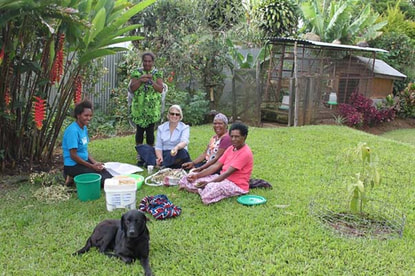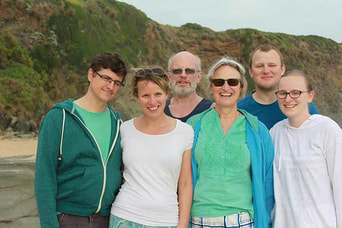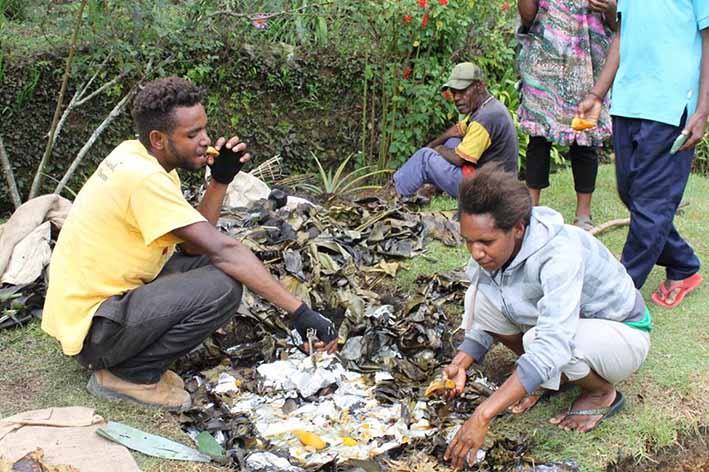 Jennifer Boer in her PNG highlands garden with friends shortly before
Jennifer Boer in her PNG highlands garden with friends shortly before her return to Australia last year.
After eight years in PNG, Jennifer Boer counts her blessings to be living in Cape Paterson – but also recalls a taste of paradise in PNG.
 Geoff and Jennifer Boer’s children joined them to celebrate their move to Cape Paterson last summer.
Geoff and Jennifer Boer’s children joined them to celebrate their move to Cape Paterson last summer. By Jennifer Boer
THIS Friday was particularly beautiful at Cape Paterson west beach. We came out of the sand-dunes track as dusk was beginning to fall. The air was full of a fine sea mist and the golden dusky light filtered the view through the water particles in a way I’ve only ever seen before in photographs.
We love our daily walks at Cape, which we have enjoyed since our return here from eight years living in the city of Mt Hagen, in the highland Waghi Valley of Papua New Guinea’s Western highlands province. Geoff and I were there with Mission Aviation Fellowship, a group that flies in tiny planes to PNG’s most remote places to bring services to mountain and swamp villages.
Geoff and I loved walking in Mt Hagen, too, enjoying the glorious vistas of hills and the picturesque gardens and grass houses, but there were significant differences. If we walked in the town I would despair at the collapsing infrastructure and piles of rotting garbage. Here on the Bass Coast we came home to a wonderful new recycling service which covers all the bases, even composting! It keeps our streets clean and healthy. Children here don’t play in garbage, hoping to find a discarded wheel or a pair of shoes; they have beautiful schools, parks, playgrounds, “mainly music” at the churches.
Here we walk in isolation without fear, but in Mt Hagen we needed to be cautious, as the abuse of alcohol and marijuana, combined with frustration at low employment opportunities and limited futures, can spill over into violence. Here we leave our front gate open without a care, with rakes and spades left out at times. If we did that in PNG they would be considered surplus to our requirements and we would be relieved of the need to care for them.
We lived in a “compound” – a fenced area with several mission houses inside. When we arrived in 2010 there were no guards, but by the time we left, we needed 24-hour guards. They became our friends and part of our life. Inside the compound I had a large garden of pineapples, paw-paws, rhubarb, pumpkins, sweet potato, greens, year-round strawberries and abundant flowers and shrubs because most things grow at 5000 feet and latitude 7. Every day is a lovely spring day, much like today in Victoria, and it mainly rains at night. It is truly paradise.
Shopping here is marvellous. We are spoilt for choice: Coles, Aldi, Woolies, specialty shops and everything is so clean! Eating out is wonderful and there’s no need to ask around to find out who caught gastro from an eatery this week before you venture out. Shopping in Hagen was a marvellous adventure at the biggest undercover market in Melanesia with abundant fresh, locally grown produce, coconuts from the coast and mangoes in season. The sellers became our friends, especially as we shopped each week for food stuff for our less blessed pilot “out-station” wives who had to feed families from what could be grown in lowland swamps or high mountains.
In church the wonderful universal Anglican liturgy allowed us to know what was going on even when we worshipped in another language. The lingua franca, “Tok Pisin” is essential in PNG, the world’s most linguistically diverse country with 838 highly valued vernacular languages. English is for government and education, but Tok Pisin is great to trade and meet across language barriers. In church here we sit in family groups; in PNG the men sit on one side and the women the other. After eight years there were still some families I hadn’t connected up!
My favourite part was after communion when all the children rushed up to the altar to kneel for a blessing and left with smiles and swaggers, knowing they were blessed and loved. The guitar band played up a storm for this part, usually a golden oldie like When the Saints Go Marching In. We also enjoyed our little grass village church, where Saturday was the time to cut fresh, sweet-smelling grass to lay on the floor which we sat on for Sunday worship – still with men one side, women on the other. Worship here was in Tok Pisin and “Tokples”- local language.
Thank you, Bass Coast, for a wonderful welcome home, to a much changed Australia. What you have all got up to whilst we have been away, swiping and re-defining marriage and filling every backyard with another house. It’s great to be here – we are so very privileged to be Australians – but I still miss my highlands home and friends sometimes.
THIS Friday was particularly beautiful at Cape Paterson west beach. We came out of the sand-dunes track as dusk was beginning to fall. The air was full of a fine sea mist and the golden dusky light filtered the view through the water particles in a way I’ve only ever seen before in photographs.
We love our daily walks at Cape, which we have enjoyed since our return here from eight years living in the city of Mt Hagen, in the highland Waghi Valley of Papua New Guinea’s Western highlands province. Geoff and I were there with Mission Aviation Fellowship, a group that flies in tiny planes to PNG’s most remote places to bring services to mountain and swamp villages.
Geoff and I loved walking in Mt Hagen, too, enjoying the glorious vistas of hills and the picturesque gardens and grass houses, but there were significant differences. If we walked in the town I would despair at the collapsing infrastructure and piles of rotting garbage. Here on the Bass Coast we came home to a wonderful new recycling service which covers all the bases, even composting! It keeps our streets clean and healthy. Children here don’t play in garbage, hoping to find a discarded wheel or a pair of shoes; they have beautiful schools, parks, playgrounds, “mainly music” at the churches.
Here we walk in isolation without fear, but in Mt Hagen we needed to be cautious, as the abuse of alcohol and marijuana, combined with frustration at low employment opportunities and limited futures, can spill over into violence. Here we leave our front gate open without a care, with rakes and spades left out at times. If we did that in PNG they would be considered surplus to our requirements and we would be relieved of the need to care for them.
We lived in a “compound” – a fenced area with several mission houses inside. When we arrived in 2010 there were no guards, but by the time we left, we needed 24-hour guards. They became our friends and part of our life. Inside the compound I had a large garden of pineapples, paw-paws, rhubarb, pumpkins, sweet potato, greens, year-round strawberries and abundant flowers and shrubs because most things grow at 5000 feet and latitude 7. Every day is a lovely spring day, much like today in Victoria, and it mainly rains at night. It is truly paradise.
Shopping here is marvellous. We are spoilt for choice: Coles, Aldi, Woolies, specialty shops and everything is so clean! Eating out is wonderful and there’s no need to ask around to find out who caught gastro from an eatery this week before you venture out. Shopping in Hagen was a marvellous adventure at the biggest undercover market in Melanesia with abundant fresh, locally grown produce, coconuts from the coast and mangoes in season. The sellers became our friends, especially as we shopped each week for food stuff for our less blessed pilot “out-station” wives who had to feed families from what could be grown in lowland swamps or high mountains.
In church the wonderful universal Anglican liturgy allowed us to know what was going on even when we worshipped in another language. The lingua franca, “Tok Pisin” is essential in PNG, the world’s most linguistically diverse country with 838 highly valued vernacular languages. English is for government and education, but Tok Pisin is great to trade and meet across language barriers. In church here we sit in family groups; in PNG the men sit on one side and the women the other. After eight years there were still some families I hadn’t connected up!
My favourite part was after communion when all the children rushed up to the altar to kneel for a blessing and left with smiles and swaggers, knowing they were blessed and loved. The guitar band played up a storm for this part, usually a golden oldie like When the Saints Go Marching In. We also enjoyed our little grass village church, where Saturday was the time to cut fresh, sweet-smelling grass to lay on the floor which we sat on for Sunday worship – still with men one side, women on the other. Worship here was in Tok Pisin and “Tokples”- local language.
Thank you, Bass Coast, for a wonderful welcome home, to a much changed Australia. What you have all got up to whilst we have been away, swiping and re-defining marriage and filling every backyard with another house. It’s great to be here – we are so very privileged to be Australians – but I still miss my highlands home and friends sometimes.
